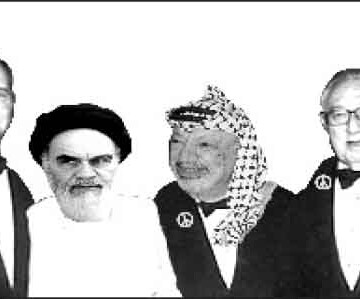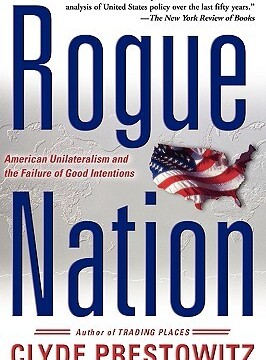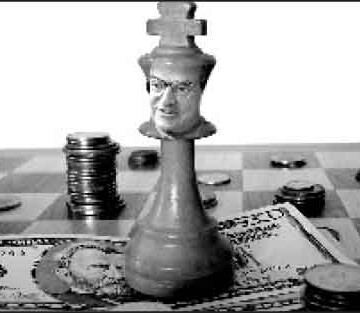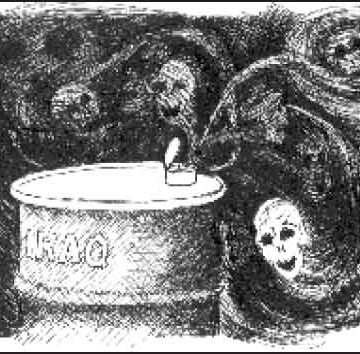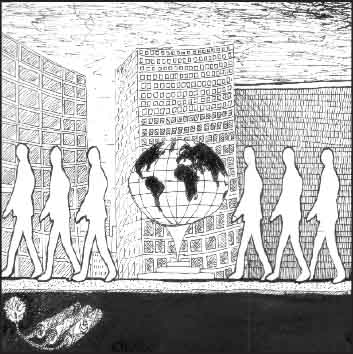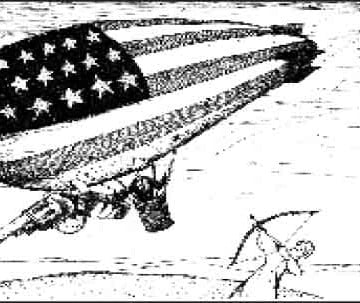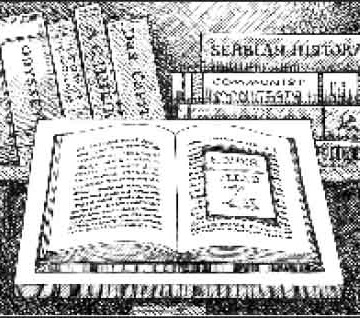Contrary to numerous optimistic assurances from high places, three years after September 11, the reach and operational capability of Islamic terror cells remain strong. They are present in areas previously closed to the recruiters of future “martyrs”—notably in Iraq—and in countries where, only a decade ago, they did not have a significant presence (e.g., Indonesia). ...
Author: Srdja Trifkovic (Srdja Trifkovic)
After Beslan: Change Course on Russia
It is hardly possible to envisage an orgy of terrorist savagery more depraved than that staged by Chechen jihadists and their foreign cohorts, who butchered, tortured, and raped hundreds of Russian children in the town of Beslan last September. The bloodbath at School No. 1 came at the end of a week in which two...
Redeployment of U.S. Forces Overseas: Long Overdue, Too Slow
Many Central Europeans who are now in their late middle age or older have fond memories of American soldiers in their midst. In France in 1944, nylon stockings and chocolates were the tools of seduction, resented by men and welcomed by ladies. In Germany in early 1945, the G.I. came to be seen as liberator,...
Former World Chess Champion
Bobby Fischer, the former world chess champion who is wanted by the U.S. government for allegedly defying U.N. sanctions by playing a match in Yugoslavia in 1992, was detained at Tokyo’s Narita airport on July 15 as he tried to leave for the Philippines. Fischer was traveling on a passport that the State Department says...
The Perils of “United Europe”
A visitor to Prague in the immediate aftermath of the Czech Republic’s formal entry into the European Union will find few outward signs that something rather momentous has taken place. Your documents are still checked at the border crossing as you drive into the country from Germany; the koruna (crown) is still the legal tender;...
Consequences of E.U. Enlargement
The European Union underwent a major transformation last May. It was enlarged to 25 states when eight former communist countries—Poland, the Czech Republic, Hungary, Slovakia, Slovenia, and three Baltic republics—were formally admitted, as well as Malta and Cyprus. The union is now a political and economic giant of 450 million people, the largest single market...
“No Credible Evidence”
The September 11 Commission (the National Commission on Terrorist Attacks Upon the United States) has found “no credible evidence” of a meaningful link between Iraq and Al Qaeda. Flatly contradicting claims by the Bush administration that such a connection justified the war in Iraq, the commission’s preliminary report released on June 16 says that Osama...
CAIR and the ADL: Partnership for Hate
At the tail end of the Russian Revolution, Lenin mocked some Mensheviks for protesting that they were not permitted to express their views in public: “Permit us to put you before a firing squad for saying that. Either you refrain from expressing your views, or, if you insist on expressing your political views publicly ....
Failing America
The Soviet Communist Party used to devote a lot of attention to the problem of inefficient agriculture. The party’s Agrarian Policy Commission debated endlessly, throughout the final quarter-century of the Soviet state’s existence, how to improve the system. Should the state farm (sovkhoz) be made self-financing? Should the collective farm (kolkhoz) have its own heavy...
Violence in Iraq
Violence in Iraq has, since the end of “major combat operations,” been largely identified with the “Sunni Triangle” in the center of the country. The Shia—who make up almost two thirds of Iraq’s 25 million people—were glad to see Saddam fall. They were prepared to accept the occupation and cooperate with the new authorities on...
Elephant Amok
This book joins dozens of others that have been written over the past two years with the goal of subjecting President George W. Bush’s foreign policy to critical scrutiny. Clyde Prestowitz’s objections are often justified—notably on the Middle East—and stated with clarity. His recommended remedies reflect a strong One World liberal bias, however, while failing...
The Victory of Fear in Spain
If, as appears certain, Islamic terrorists planted the bombs that killed over 200 commuters and wounded 1,400 others on Madrid’s trains on March 11, the operation was singularly successful in achieving its political objectives. Until that morning, the Popular Party (PP) government of the former prime minister José Maria Aznar looked poised to win the...
The Assassination of Yassin
Israel’s assassination on March 22 of Sheik Ahmad Yassin, founder of the Hamas militant group in the Gaza Strip, has prompted Arab calls for revenge against Israeli and American targets. His funeral in Gaza City, attended by more than 100,000 people, reflected a new tide of militancy throughout the region. New Hamas leader Abdelaziz Rantissi...
Europe and America
Studies have established that identical twins separated at birth exhibit very similar physical, psychological, and biochemical traits, regardless of the environment in which they grow up. They will have similar voices, gestures, tastes, incomes, professions, wives—and similar diseases. A twin adopted by an Italian firefighter from New Jersey and his brother reared by a Jewish...
Pakistan’s Nuclear Proliferation
In a speech at the National Defense University in Washington, D.C., on February 11, President Bush warned against the spread of nuclear, biological, and chemical weapons and suggested measures to dismantle a growing black market in nuclear fuel and technology. He called the possibility of a sudden attack by weapons of mass destruction “the greatest...
The Balkan Terror Threat
A chain is as strong as its weakest link. In President Bush’s “War on Terror,” that weak link is not in the Middle East or North Africa or the Subcontinent but in Europe. For years, Chronicles has been warning that flawed pro-Muslim Western policies would turn the Balkans from a “protectorate of the New World...
George Soros, Postmodern Villain
George Soros was born in Budapest in 1930 but, today, spends most of his time in New York City. Not much is known about his early years. He is the only eminent “holocaust survivor” who has been accused of collaboration with the Nazis. In 1947, he managed to sneak through the Iron Curtain, and, the...
The Battle for Bush’s Ear and Soul
It is reasonable to assume that a country’s foreign policy is conducted in the interest of that country’s security and well-being and that those entrusted with its formulation and conduct will act in a coherent and rational manner. At the end of 2003, the foreign policy of the United States was neither coherent nor rational. ...
Mr. Bush and Democracy in the Middle East
In 1980, Ayatollah Khomeini told Oriana Fallaci that Western music dulls the mind. “It involves pleasure and ecstasy, similar to drugs,” he explained; it does not exalt the spirit but puts it to sleep, and “it distracts our youth who become poisoned by it.” “Even the music of Bach, Beethoven, Verdi?” Fallaci asked. “I do...
Lord Ashdown’s Balkan Fiefdom
For 200 years, the Balkan states have been manipulated by the powers of “Old Europe” to slow and control the collapse of the Ottoman Empire. They were created, enlarged, and shrunk as the need arose. During the two world wars, the territories inhabited by southern Slavs were used as bargaining chips in constructing alliances, while...
Out of Korea
Another futile round of the six-nation talks on North Korea’s nuclear program ended in Beijing last September. The communist authorities in Pyongyang subsequently declared that further negotiations involving both Koreas, China, Japan, Russia, and the United States were pointless, but China said it was working to arrange a second round of talks. For once, I...
The Iraq Quagmire
The lies and distortions surrounding the stated rationale for the war against Iraq now appear crude, clumsy, and embarrassing. While it would have been unrealistic to expect Messrs. Bush, Rumsfeld, and Wolfowitz to display Bismarckian finesse in setting up Saddam Hussein, six months after the war was declared over, their actions should be judged by...
Reforming the Military
On August 25, Secretary of Defense Donald Rumsfeld announced that he would look into ways to strengthen U.S. combat power without increasing the size of the military. While the “end-strength” of 1.4 million should stay the same, he intends to rebalance the active and reserve components, sending underutilized active-duty personnel to the reserves and moving...
Out of Africa
But for the death and suffering it has caused to thousands of innocents, the Liberian imbroglio would have an almost farcical quality—Graham Greene meets Lehar. On one side, there was the LURD (Liberians United for Reconciliation and Democracy), a ragtag army of heavily armed but poorly trained and undisciplined rebels. They nevertheless have the upper...
Exiting Iraq
It is sometimes necessary for a great power to keep a distant small country under military occupation—if need be, for a very long time. The Romans could not contemplate an “exit strategy” from Palestine in the first century A.D.—or from a few other hotspots around the empire’s outer perimeter—without compromising their status as the world’s...
Where Are Our Principles?
The E.U. Constitution, drafted by a committee chaired by former French “conservative” president Valéry Giscard d’Estaing, debuted on June 10. With a metaphysical sweep worthy of Hegel, d’Estaing described the 75-page document as “an edifice, a construction, an equilibrium, a balance . . . a synthesis.” Beethoven’s “Ode to Joy,” the anthem of the European...
Fragile Empire
There have been strong empires with weak currencies, but not often and not for long. The Soviet Union, Spain after Philip II, the Ottoman Empire after Suleiman, and an impoverished Britain after Versailles all come to mind. That financially fragile states cannot support ambitious political and military ventures is obvious to common sense and confirmed...
A Surprising Unsureness of Touch
The one surprising aspect of the controversy surrounding Iraq’s “weapons of mass destruction” is not the failure to find them: Those in the know had known all along that they did not exist. It is, rather, the Bush administration’s inept handling of a situation that should have been anticipated months ago, when the “bureaucratic” decision...
A Road Map to Nowhere?
In the aftermath of the war in Iraq, its most determined advocates predictably claimed that the United States should proceed with her alleged mission of bringing democracy to the Middle East. The advocates of this approach seek to push the Israeli-Palestinian issue into the background, to subordinate it to whatever their agenda may be in...
Iraq’s Collapse
The war in Iraq’s outcome was never in doubt, but the magnitude and speed of the Iraqi regime’s collapse are nevertheless puzzling and deserve closer scrutiny. In terms of numbers and available equipment, the Iraqi military was theoretically a foe worthy of respect. Its past performance was by no means abysmal. It suffered serious reverses...
Turkish Delights
Four weeks before the latest war against Iraq, President George W. Bush declared that it would be motivated by a “vision” of democracy and liberation for the entire Middle East. A U.S.-sponsored regime change in Baghdad, he proclaimed, would “serve as a dramatic and inspiring example of freedom for other nations in the region.” Only...
Yugoslavia, R.I.P.
On February 4, the Federal Assembly in Belgrade formally dissolved the state known as Yugoslavia and replaced it with a loose union of its remaining two republics, Serbia and Montenegro. On February 25, the separate parliaments of Serbia and Montenegro voted to nominate deputies for the new joint legislature that was then slated to elect...
Privatization in Serbia
In articles dealing with the 2002 presidential election in Serbia, I have made passing references to Zoran Djindjic as “Serbia’s kleptocratic prime minister” and to his “corrupt establishment” that “controls the economy and the media more stringently than Milosevic had ever done.” While such designations would be considered unremarkable by most of Serbia’s impoverished and...
Same Old Song and Dance
President George W. Bush painted a pleasingly simple black-and-white picture of the world in his State of the Union Address on January 28. It was a choreographed political speech with several statements of strong intent rather than a factual assessment of the nation’s current “state.” That America is strong and resolute, while Saddam Hussein is...
Europe Skeptical About NATO Enlargement
On November 21, 2002, NATO leaders meeting in Prague invited seven ex-communist nations to join their ranks in an expansion termed “historic.” The three Baltic republics of Estonia, Latvia, and Lithuania (the alliance will, for the first time, include former Soviet territory), as well as Bulgaria, Slovakia, Slovenia, and Rumania are expected to become full...
The Justification for War
During the Cold War, occasional resorts to war or threats of war by the United States were justified by the need to keep communism in check. This justification had the advantage of being based on a real threat—notably in Berlin in 1949, in Korea in 1950, and during the Cuban missile crisis in 1962. The...
Pakistan, Our Untrustworthy Partner
As the first contingent of U.N. weapons inspectors arrived in Iraq last November, U.S. government sources leaked a disturbing story about one of our key “allies” in the War on Terror. Pakistan apparently has been helping North Korea with her nuclear-weapons program for years, in return for missile technology that would strengthen her own hand...
Middle East Resources
The minefield of Middle Eastern myths, passions, and deceit is so dense that even making a factual statement may open you to accusations of bias and mendacity. It would take an entire issue of Chronicles just to provide a comprehensive bibliography and a list of the websites relevant to the Middle East. However, the non-idiot...
Another World
“What doth it profit a man if he gain control of the whole world and lose control of his country?” My first encounter with the new, post-national ruling class came in the early 1980’s. I was a young broadcaster with the BBC Yugoslav Service (as it was called then), and my work took me to...
Turkey Goes Islamic
On November 3, Islam triumphed politically in Turkey, rendering the entire U.S. strategy in the Middle East tenuous and causing dismay in Europe. Recep Tayyip Erdogan, barred from public office for Islamic agitation, led his Justice and Development Party (AKP) to a landslide victory over his secularist opponents in NATO’s only Muslim nation. Muslims will...
Francophile Pursuits
Jacques Chirac, in the last week of October, called off the Anglo-French summit scheduled for December after angrily accusing British Prime Minister Tony Blair of speaking to him with extraordinary insolence over the future of the European Union’s Common Agricultural Policy (CAP) and Africa. The French president told Mr. Blair, “You have been very rude,...
The Hollow Empire
America’s present position is paradoxical. On the one hand, her unparalleled power and wealth are reflected in the astoundingly imperialist “National Security Strategy” unveiled last October, which asserts a right to stop any country “from pursuing a military build-up in hopes of surpassing or equaling the power of the United States.” That America is a...
Baghdad or Pyongyang?
Last October, North Korea announced that it has a nuclear-weapons program. Defense Secretary Donald Rumsfeld confirmed that North Korea already has a “small number” of nuclear weapons, and a Pentagon official later added that the United States thought Pyongyang had two nuclear bombs. The stunning revelations sent shockwaves around the world, but the White House...
An Invalid Election
Serbia’s?recent presidential election failed to muster enough votes to be valid. Only 46 percent of voters cast ballots in the run-off between current Yugoslav president Vojislav Kostunica and his rival, Miroljub Labus. Kostunica beat Labus by a two-to-one margin, but, without the minimum turnout of 50 percent, the outcome was void. What happens next is...
Winning Another Term
Gerhard Schroeder has won another four-year term as German chancellor following his Red-Green coalition’s victory in September—the narrowest ever seen in a German election. Until just weeks before the election, he was expected to lose, and, considering his record, deservedly so. Under Chancellor Schroeder, Germany has enjoyed a double-digit unemployment rate—over four million Germans are...
Serbia’s Presidential Election
The current president of the soon-to-be-defunct Yugoslav Federation, Vojislav Kostunica, has won the initial stage of Serbia’s presidential elections, the first held since the fall of Slobodan Milosevic almost exactly two years ago. Kostunica garnered 31 percent of the vote, with Miroljub Labus—the “pro-Western, reformist” candidate supported by the “international community”—coming in second at 28...
The Coming War in Iraq: Dangerous and Unnecessary
In the final years of the Soviet Union, as glasnost broadened the scope of permissible public debate, it was still deemed advisable to precede any expression of controversial views with a little disclaimer. For example, “While I hold no brief for the Islamic dushmans terrorizing the people of Afghanistan, I think we should withdraw from...
Another Bailout
Brazil is about to receive another IMF bailout, funded chiefly by American taxpayers. While the main beneficiaries will be a few private banks whose loans are at risk, there is practically no public debate about the deal. This is the second Brazilian bailout in only four years. In the summer of 1998, the IMF put...
A “Communist” Education Remembered
Belgrade’s Tenth Gymnasium was a well-proportioned neoclassical building in a leafy park three miles from the city center. Built by King Alexander shortly before his ill-fated trip to Marseilles, it bore his name until the Partisans’ victory in 1945 and was considered a very good secondary school. Many of its students came from the provinces...
Corporate America in Crisis
The ongoing turmoil in America’s stock markets and a series of corporate scandals have attracted considerable attention from commentators and editorialists all over the developed world, who fear that economic instability in the United States may plunge the world’s top businesses into a vicious cycle of doubt and deferred capital investment. With the world’s stock...


